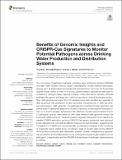Benefits of Genomic Insights and CRISPR-Cas Signatures to Monitor Potential Pathogens across Drinking Water Production and Distribution Systems
Author(s)
Zhang, Ya; Kitajima, Masaaki; Liu, Wen-Tso; Whittle, Andrew
Downloadfmicb-08-02036.pdf (2.976Mb)
PUBLISHER_CC
Publisher with Creative Commons License
Creative Commons Attribution
Terms of use
Metadata
Show full item recordAbstract
The occurrence of pathogenic bacteria in drinking water distribution systems (DWDSs) is a major health concern, and our current understanding is mostly related to pathogenic species such as Legionella pneumophila and Mycobacterium avium but not to bacterial species closely related to them. In this study, genomic-based approaches were used to characterize pathogen-related species in relation to their abundance, diversity, potential pathogenicity, genetic exchange, and distribution across an urban drinking water system. Nine draft genomes recovered from 10 metagenomes were identified as Legionella (4 draft genomes), Mycobacterium (3 draft genomes), Parachlamydia (1 draft genome), and Leptospira (1 draft genome). The pathogenicity potential of these genomes was examined by the presence/absence of virulence machinery, including genes belonging to Type III, IV, and VII secretion systems and their effectors. Several virulence factors known to pathogenic species were detected with these retrieved draft genomes except the Leptospira-related genome. Identical clustered regularly interspaced short palindromic repeats-CRISPR-associated proteins (CRISPR-Cas) genetic signatures were observed in two draft genomes recovered at different stages of the studied system, suggesting that the spacers in CRISPR-Cas could potentially be used as a biomarker in the monitoring of Legionella related strains at an evolutionary scale of several years across different drinking water production and distribution systems. Overall, metagenomics approach was an effective and complementary tool of culturing techniques to gain insights into the pathogenic characteristics and the CRISPR-Cas signatures of pathogen-related species in DWDSs.
Date issued
2017-10Department
Massachusetts Institute of Technology. Department of Civil and Environmental EngineeringJournal
Frontiers in Microbiology
Publisher
Frontiers Research Foundation
Citation
Zhang, Ya et al. “Benefits of Genomic Insights and CRISPR-Cas Signatures to Monitor Potential Pathogens Across Drinking Water Production and Distribution Systems.” Frontiers in Microbiology 8 (October 2017): © 2017 Zhang, Kitajima, Whittle and Liu
Version: Final published version
ISSN
1664-302X